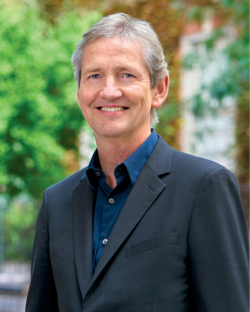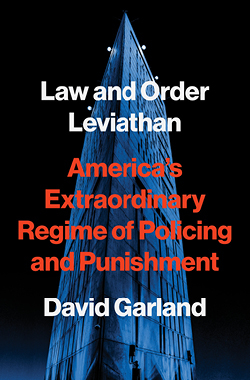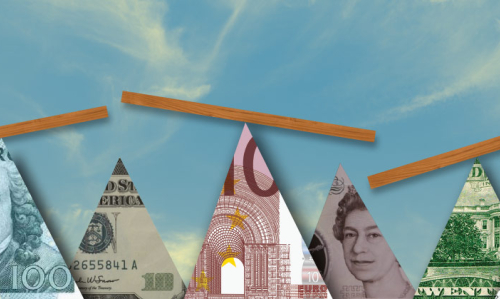David Garland examines the US penal state in a new book, ‘Law and Order Leviathan’

In a book talk on October 7, David Garland, Arthur T. Vanderbilt Professor of Law, joined Vice Dean of Intellectual Life Emma Kaufman, Sarah Herring Sorin Professor of Law, and Professor Vincent Southerland to discuss what Kaufman called “the most thoughtful causal account of crime and punishment that I’ve ever read.”

The subject of their discussion was Garland’s new book, Law and Order Leviathan: America’s Extraordinary Regime of Policing and Punishment, which examines how the United States has come to outstrip other developed nations in levels of criminal violence and systems of penal control. Kaufman explained Garland’s argument in her opening remarks: “In this book, the weak welfare state is the background necessary condition for crime’s more proximate causes—socially disorganized neighborhoods, family disruption, free flowing guns—to become virulent. Once those social forces generate crime,” she added, “then again the [weak] welfare state appears and dooms us to carceral rather than social responses to the crime.”
Crime and punishment has been a key focus in Garland’s scholarship, which includes influential works on criminology such as The Culture of Control: Crime and Social Order in Modern Society (University of Chicago Press, 2001) and Punishment and Modern Society: A Study in Social Theory (University of Chicago Press, 1990). In 2020, Garland said, the killing of George Floyd by a police officer and a rising debate over prison abolition inspired him to return to a scholarly question that had long interested him: America’s uniquely expansive penal state and how it came into being. He also decided to take up the related abolitionist question: should the system be scrapped entirely, rather than reformed?

“On so many dimensions, the US is just an outlier,” Garland said, ticking off a range of metrics: number of people in prison, number of people killed by police, the extent of stop and frisk, the nature and length of sentences, or the fees and disenfranchisement imposed on convicted persons. As Kaufman noted, Garland’s analysis is nuanced and takes issue with arguments advanced by both the right and the left. “One of the things I tried to do in the book was scramble the politics,” Garland said as he laid out the principal themes of his book.
Racism by itself is not an adequate explanation for the scope of the US penal state, Garland argued, noting that other countries have similar racial disparities within their prison populations. Garland pointed to political economy—in particular, labor market insecurity and the concentration of poverty in disadvantaged communities—as the major force shaping American crime and punishment over the past half-century.
“The fact that our political economy, our labor market, our distribution of resources is so incredibly unequal and so incredibly unsupportive and disruptive to family formation, community life, in so many neighborhoods, explains why we have such lethal violence,” Garland said. Lack of resources, he said, “actively undermine[s] the capacities in many communities to socialize…young people, to get them into schools where they’ll stay, to get them into jobs where they’ll be able to form a family, where they’ll have a stake in conformity. All these things are delivered less effectively in this country, and all of them got worse after the collapse of the New Deal, deindustrialization, the withdrawal of federal funding from the urban problems…. And so we saw a spike in crime and illegal violence…over that time. Which is when the penal state began to ramp up.”
According to much sociological research, the connection between poverty and violence “runs through the family,” Garland said, but he specifically rejected the argument raised in the Moynihan report in the 1960s—and repeated often since—that attributed Black poverty to single-parent families.
“It’s not the breakdown of the family… it’s the lack of support for families that are stretched in this country,” he said. “…If you have single parents…that household needs a lot of resources and a lot of support. It needs healthcare, it needs childcare, it needs decent housing, it needs basically schools that are supportive of the project of raising and educating and socializing these kids.”
How to break America’s cycle of crime and punishment? Garland hailed the interest and enthusiasm around abolitionism, but argued instead for reform of the penal system, including policing. Calls to defund the police are “highly problematic,” he said: what’s needed is better, smarter policing.
“By and large, our police are underpaid, undertrained, underqualified, and not accountable,” Garland said. “We don’t need to defund the police. We need to actually pay more money and have better police [and] narrow their range of activities so that they stop being the only 24-hours-a-day, seven-days-a-week service available [for] all these things that we have the police do because we have no other apparatus of the welfare state infrastructure.”
On a hopeful note, Garland pointed out that there is wide variation across the US in levels of violence and the penal response, and in some cases, dramatic change has been possible without shifts in the underlying political economy. New York State, for example, has reduced its prison population while seeing a decline in homicide rates. Local conditions and processes can have a major impact, he said. “The USA is not going to become the Nordic nations any time soon,” Garland said, referring to the more robust social safety net found in northern European nations, “…but that doesn’t mean to say that the penal state, policing, homicide control, crime control…needs to stay where we are right now.”
“In some ways, you’re telling a truth that I think is much like what [civil rights scholar] Derrick Bell would talk about,” Southerland commented, as he described his own reactions to Garland’s book. “He talked about the notion of racism as a permanent force. I see this law and order leviathan as another permanent force, but it doesn’t mean that we should throw up our hands and give up. It does mean that we can still advance change, even if it’s in in those narrow bands where we think change is possible.”




